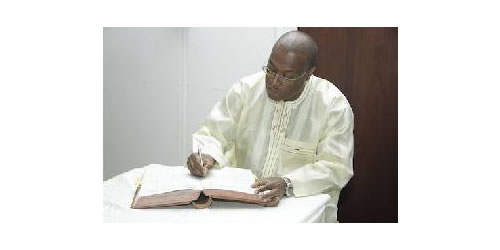Labour Unions case adjourned

The Industrial and Labour Court on Monday adjourned hearing of the case involving government and the 12 labour unions to January 29.
The adjournment was after the Counsel for the Bank of Ghana, Samuel Codjoe told the court that the financial entity had not been served with the hearing notice.
He told the court that the bank was not aware that the case was to be heard on Monday until it was aired on radio in the morning and also upon his arrival in court he had a message from the bank that they had just been served.
He said he went to court to ask for a date in order for him to come fully prepared to move the motion.
The court presided over by Justice Saeed Kwaku Gyan was forced to adjourn the case due to the problem of improper service of notice.
He said there was an affidavit on the court docket indicating that the Bank of Ghana had been served on January 22. But according to the bailiff the notice was served on someone at the registry of the bank instead of the bank’s secretary.
He cautioned parties involved in the case to always remember that they owe it a duty to the country to ensure that the case is done with as early as possible.
He said they should try to co-operate so that the case would go as planned and little things that would obstruct the hearing of the case should not be allowed by anyone.
At the last sitting the court adjourned the case and ordered the court registrar to duly serve the Bank of Ghana with the hearing notice before the next adjourned date.
According to the court there was no proof on its records that the Bank had been served with any hearing notice.
Earlier on the court granted an interlocutory injunction sought by the State restraining the labour unions from embarking on further strikes.
Government had filed a writ before the Court seeking a declaration that the indefinite strike embarked upon by public sector workers was illegal and that the personnel should return to work.
“This is a proper case that needs to be granted the injunction,” he added.
The judge urged the unions, especially its executives and members to exercise decorum and self-restraint in the best interest of the country.
He said it should not take the intuition of a prophet to know that the action of the unions would lead to the melt down of government machinery.
Mr Gyan said the action of the unions, especially doctors and nurses, who provide services to the citizenry, would cause death of patients.
He said public policies must frown on those issues, indicating that he could however not say the strike by the Unions constituted a breach of contract.
An 18-point statement of claim said, among other issues: “The plaintiff’s claim is for an order that the defendants call off their illegal strike and resume work, as mandated by their respective contracts of employment.
“The plaintiff’s claim is for an order that the defendants jointly and severally pay to the government, as employer, any financial or economic loss suffered by the government during the pendency of the strike,” it said.
Public sector workers across the country last year declared a strike to protest against government’s decision to manage their second-tier pension funds, saying the decision was in contravention of the Pension Law.
However, the Attorney-General, in the statement of claim, stated: “On a true and proper construction of sections 129 and 211 of the National Pensions Act, 2008 (Act 766), the government is the employer of all public sector workers and is consequently entitled to appoint a trustee or trustees in relation to the second-tier pension scheme.”
It further prayed the court that “In the alternative, a declaration that upon a true and proper construction of sections 129 and 211 of the National Pensions Act, 2008 (Act 766), neither an employee nor a representative of such employee is by law entitled to sponsor an employer-sponsored scheme or a master trust scheme in relation to the second-tier pension”.
The statement of claim said the plaintiff felt the grievance based upon which the aggrieved labour groups resorted to the indefinite strike was grossly misconceived and without any basis, “as the appointment of a trustee to manage the second-tier pension of public sector workers is exclusively the preserve of their employer, that is, the government of Ghana”.
“Plaintiff avers that the appointment of the Pension Alliance Trust to administer and manage the second-tier pension of public sector workers was done after a process of rigorous screening by the Minister of Finance of five shortlisted companies in accordance with criteria established by the NPRA (National Pension Regulatory),” it added.
It said as the employer of all public sector workers, the government had not impeded and did not intend to impede in any way whatsoever the full implementation of the second-tier pension scheme for government employees.
“Plaintiff states that the government, as the employer of all public sector workers, represented by the defendants, has a vested interest in the contributions it pays monthly towards the retirement of its employees and cannot abdicate that responsibility to defendants,” it said.
Consequently, membership of more than 800,000 workers called off the strike following the court order.
The unions include Health Service Worker Union, Ghana Registered Nurses Association, Ghana Medical Association, Government and Hospital Pharmacists Association, Ghana Physician Assistant Associations, Ghana Association of Certified Registered Anesthetists, Ghana National Association of Teachers, Teachers and Education Workers Union, National Association of Graduate Teachers and the Judicial Service Staff Association.
SOURCE: GNA





